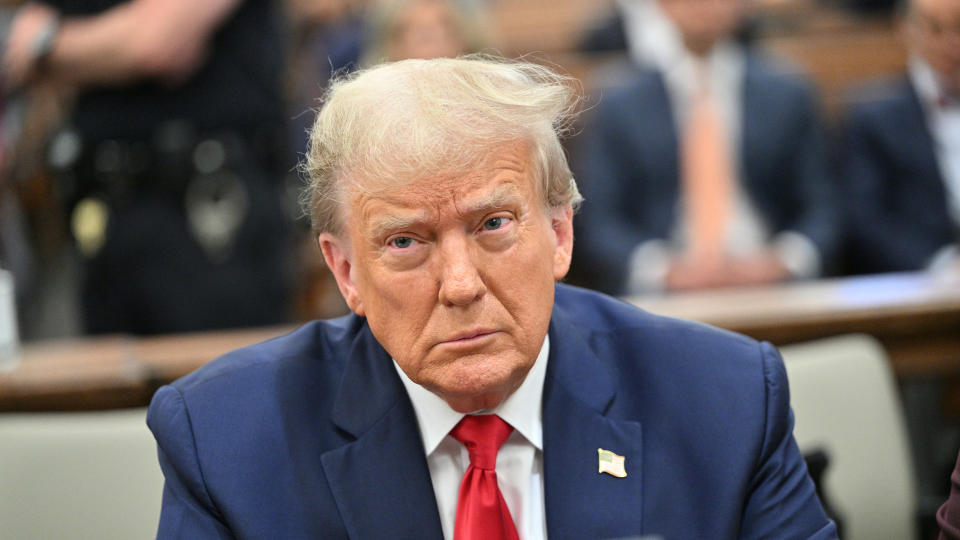Donald Trump’s Money Timeline: See the Former President’s Financial Milestones

Donald Trump’s career has been quite a ride. After inheriting a real estate company from his dad, the former president’s path to where he is today has been anything but predictable.
Find Out: How Rich Is Donald Trump?
Discover More: 4 Genius Things All Wealthy People Do With Their Money
From his first Manhattan property deals to his casino bankruptcies, GOBankingRates is diving into the former president’s financial milestones.
Also see what a second Trump presidency could mean for inflation.
19th Century: The Trump Family Inheritance
Donald Trump’s grandfather, Frederick Trump, reportedly owned an inn and restaurant that served miners during the Klondike gold rush in Canada. When Frederick died, he left an estate worth around $500,000 (in today’s dollars) to his heirs, including his son Fred Trump, Donald’s father. This early inheritance helped establish the Trump family’s foothold in real estate and hotels.
Learn More: Trump-Era Tax Cuts Are Expiring — How Changes Will Impact Retirees
1920s: Fred Trump’s Real Estate Success
Using his inheritance as seed money, Fred Trump became a very successful builder in New York City’s outer boroughs. He constructed single-family homes in Queens in the 1920s and helped pioneer the supermarket concept with Trump Market during the Great Depression.
Fred’s biggest payday came in 1949, when he secured a government loan to build the Shore Haven apartments in Brooklyn, which he was able to construct for significantly less cost.
1970s: Donald Trump Joins the Family Business
Born in Queens in 1946, Donald Trump joined his father’s real estate company early in his career. Envisioning the Trump brand as synonymous with luxury worldwide, Donald borrowed $1 million from his father’s business connections and creditworthiness to venture into Manhattan real estate in the mid-1970s. This loan helped launch his buildings and developments.
1976: The Commodore Hotel Deal
In 1976, Donald Trump partnered with his father and Hyatt to purchase the rundown Commodore Hotel near New York’s Grand Central Station for $79 million. Trump negotiated with banks and the city to fund renovations that transformed it into the Grand Hyatt Hotel. He reportedly sold his stake in the successful property for $142 million in 1996.
1982: First Appearance on Forbes 400
In 1982, Donald Trump made his debut on the inaugural Forbes 400 ranking of the wealthiest Americans alongside his father, Fred. The father-son duo had a combined estimated net worth of $200 million at that time, according to Forbes.
1991: Bankruptcy No. 1
In 1991, Trump’s corporate entity that owned his Atlantic City casinos filed for Chapter 11 bankruptcy protection. This was spurred by the $3 billion in debt racked up by the newly opened Taj Mahal casino, as well as $900 million in personal liabilities. To get out of bankruptcy, Trump had to give up prized personal assets including his Trump Shuttle airline, his Trump Princess mega-yacht, and over half his stake in his casino company.
1996: 40 Wall Street Acquisition
Another triumph was Trump’s acquisition of 40 Wall Street, once the tallest building in the world. This prime financial district real estate holding recently has been estimated to be worth over $500 million, making it one of Trump’s most lucrative property deals — although he does not own the building, just the leasehold.
Early 2000s: Alleged Billionaire Status
According to claims made during Trump’s presidential campaign, he has a net worth in excess of $10 billion, though Forbes and Bloomberg have published much lower estimates of his wealth. Regardless of the differing evaluations, Trump may have achieved billionaire status in the early 2000s due to the significant appreciation of his global real estate holdings and other business ventures at that time.
2004: Bankruptcy No. 2
Trump Hotels & Casino Resorts, the corporate entity that owned Trump’s Atlantic City casinos, entered its second Chapter 11 bankruptcy in 2004. This stemmed from the company accumulating around $1.8 billion in debt through the casinos’ continued struggles. This bankruptcy further reduced Trump’s equity stake in the business.
2004-17: ‘The Apprentice’ Success
As host and executive producer of the hit reality show “The Apprentice,” Trump raked in $1 million per episode in payments. Over its 185 episodes from 2004 to 2017, “The Apprentice” earned Trump a staggering $197 million thanks to his roles on the program, according to The New York Times.
2009: Bankruptcy No. 3
The third and final bankruptcy involving Trump’s Atlantic City casinos came in 2009 when Trump Entertainment Resorts missed a $53 million interest payment on its debt during the financial crisis fallout. This bankruptcy eliminated Trump’s remaining minority ownership stake in the casinos he had started acquiring in 1988.
More From GOBankingRates
This article originally appeared on GOBankingRates.com: Donald Trump’s Money Timeline: See the Former President’s Financial Milestones

 Yahoo Finance
Yahoo Finance 